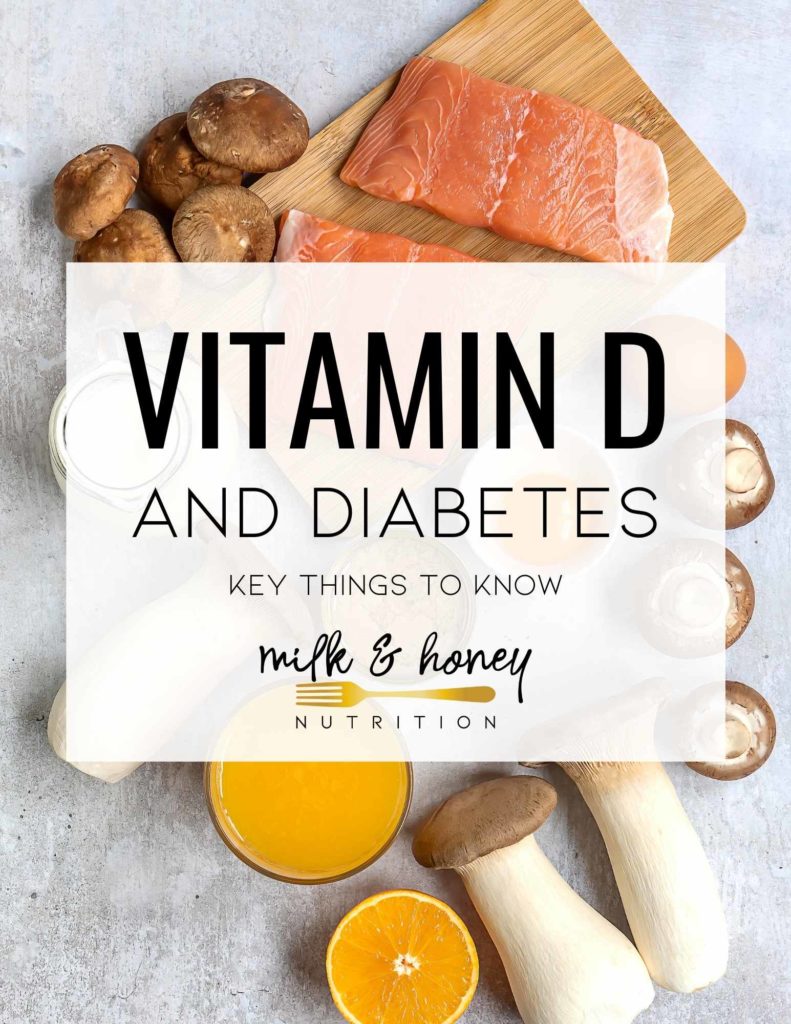
The connection between vitamin D and diabetes is talked about a lot in the media and has been studied for quite some time.
So, what do you need to know about vitamin D and diabetes? In this article we’ll cover the connection between vitamin D and both type 1 and type 2 diabetes development and treatment.
What is vitamin D?
Vitamin D is a fat soluble vitamin necessary for our bodies to function. We can get vitamin D from foods we eat and our bodies can make vitamin D under certain circumstances.
Why do we need vitamin D?
Vitamin D plays a role in many different body functions including:
- Calcium absorption
- Phosphorous absorption
- Building bone matter
- Immune function
- Inflammation control
- Insulin function
Food sources of vitamin D
There aren’t a ton of foods that naturally contain significant levels of vitamin D, but many foods are fortified with vitamin D.
Natural sources of vitamin D include:
- Fish: Salmon, swordfish, tuna
- Egg yolks
Common foods fortified with vitamin D include:
- Cereals
- Orange juice
- Milk
- Yogurt

Vitamin D: The sunshine vitamin
We can get vitamin D through our diets, but our bodies also have the ability to make vitamin D. In fact, most of the vitamin D currently in your body is vitamin D3 that your body has produced as a result of exposure to ultraviolet-B (UVB) rays. But, depending on where you live and your skin tone, you may be at risk for vitamin D deficiency and should consult your health care team on whether or not a supplement is right for you.
Many people are deficient in vitamin D and in need of supplementation.

Are vitamin D deficiency and diabetes linked?
Much of the data we have on vitamin D deficiency and diabetes (both type 1 and type 2) is what we call an association, not a cause and effect. In other words, we know that vitamin D deficiency is associated with both type 1 and type 2 diabetes, but it doesn’t necessarily cause diabetes.
Can vitamin d affect blood sugar levels?
Research has shown us that vitamin D deficiency may contribute to the development of both type 1 and type 2 diabetes. And vitamin D supplementation may help increase insulin sensitivity. Increased insulin sensitivity can lead to improved blood sugar management.

Research summary: Vitamin D and type 1 diabetes
Research has shown a link between vitamin D deficiency early in life and later developing type 1 diabetes. Type 1 diabetes is also associated with certain genetic mutations related to vitamin production and absorption.
Research summary: Vitamin D and type 2 diabetes
Because we know vitamin D plays a role in both insulin production and insulin sensitivity, it makes sense that vitamin D deficiency could also impact your risk for type 2 diabetes.
Can low vitamin D cause high blood sugar?
From what we can see in the research, low vitamin D is not going to cause high blood sugar in and of itself. But, vitamin D deficiency, along with other factors, may contribute to lower insulin production or sensitivity.
Can low vitamin D and insulin resistance be related?
Yes, low vitamin D levels have been associated with decreased insulin sensitivity/insulin resistance.
Can vitamin D reverse diabetes?
Vitamin D supplementation may not benefit people who already have adequate levels of vitamin D. But, people with vitamin D deficiency and impaired glucose metabolism (prediabetes and type 2 diabetes) may benefit from vitamin D supplementation.

Metformin and vitamin D concerns
After being diagnosed with pre-diabetes or type 2 diabetes, many people start on Metformin as a first stage of medical treatment to help manage blood sugar levels. Vitamin B12 deficiency is a common side effect of treatment with Metformin so many people naturally wonder if the same is true about Metformin and Vitamin D.
Metformin does not cause vitamin D deficiency. And, a vitamin D supplement and Metformin do not appear to interact with each other or cause side effects as a result of being taken together.
Vitamin D and blood sugar: Key things to take away
The key thing to take away from the research to date is that vitamin D deficiency and diabetes (both type 1 and type 2) are linked, but vitamin D deficiency alone does not cause diabetes. This does mean though that vitamin D deficiency can increase your risk for developing diabetes.
What about other supplements and diabetes?
A quick scroll online and you’ll see supplements touted for diabetes all over the internet. But, do they really do what they say they do? Read more about diabetes and 20+ supplements here.





